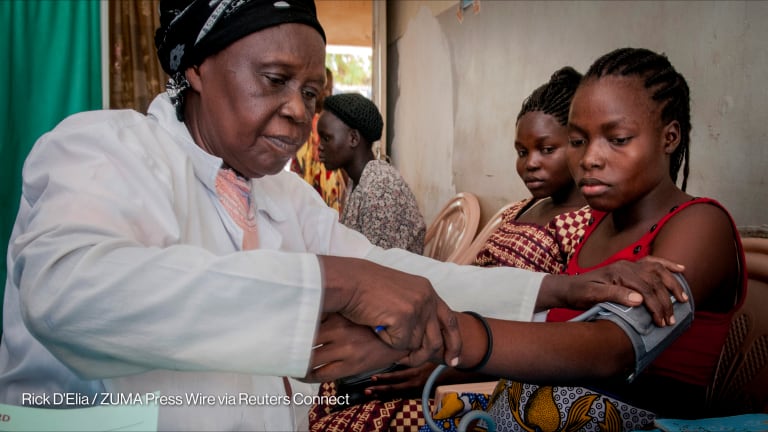Opinion: Making it possible for refugee health workers to answer their calling

His name might be Mohamed, or Ali or Sami. Her name might be Fatima or Amira or Iman. They are all refugees — forced to leave their home countries — but also forced to leave behind their professions as doctors and nurses.
There are an estimated 65 million people who have fled conflicts of all sizes and geographies. To date, 11 million Syrians alone have fled their homes, seeking refuge from a devastating conflict. The United Nations High Commissioner for Refugees estimates there are close to 5 million living in bordering countries. Many of these individuals have spent years training to become doctors, nurses, midwives or other health professionals. As refugees, however, their education and skills are now being wasted, even in settings where people with clinical skills are badly needed.
See related stories:
► Emerging best practices from Iraq for psychosocial support in emergencies
► For first time, WHO as implementer in Mosul trauma 'chain of care'
► How Iraq and Syria put psychosocial care into emergency education
The World Health Organization data tells us that the global health workforce is experiencing a shortage of 7.2 million doctors, nurses and midwives — a shortage that will increase to 18 million by 2030 unless urgent action is taken. In many parts of the world, the shortage of faculty and a faltering pipeline of new trainees is contributing to this gap.
The irony is that this shortage is happening at a time when many health workers are being underutilized. In a 2014 report by Massachusetts Advisory Council for Refugees and Immigrants, the task force found that there were 3,000 doctors unable to work, unemployed, or working in low-wage, low-skilled jobs in Massachusetts alone. Imagine the statistics in the Middle East, which shelters the vast majority of Syrian and Middle Eastern conflict-affected refugees.
So how can we fix the problems that are preventing trained health workers from being fully utilized as clinicians and educators in the health workforce? First, we need data. Urgently. Understanding how many skilled health workers are out there, and where they are, is a critical start to helping them get to work. We can then take the necessary steps to restore their professional identities and verify credentials lost in flight and conflict.

Second, deploying refugee health professional to work in refugee camps and/or countries where there are critical shortages of health workers would benefit the refugees and the host community. Health workers are already in short supply in refugee camps, where many people arrive in poor health, and where they are at higher risk from diarrheal disease, malnutrition, respiratory conditions and infectious diseases. We could be making it possible for well-trained professionals who are living in refugee camps to help provide care for the very populations they already know so well, reducing cultural and language barriers. Additionally, refugees could patriate in countries with critical shortages of faculty and health providers. Through NGOs and partner countries with severe shortages of health professionals, refugees would be able to reclaim their livelihoods, provide much needed care to at-risk communities and help train future health professionals.
As a physician, I feel deeply that working in health care is more than a job. It’s a calling. My colleagues in flight from conflict and peril are no different. In the hospital where I work, I have met technicians who are, in fact, trained physicians. In Boston’s streets, I have ridden with cab drivers who were once surgeons. Making sure that skilled workers are able to answer that call by putting their education and training to work, will strengthen the health systems of whatever country they happen to be in — and benefit us all.
Join the Devex community and access more in-depth analysis, breaking news and business advice — and a host of other services — on international development, humanitarian aid and global health.
Search for articles
Most Read
- 1
- 2
- 3
- 4
- 5






